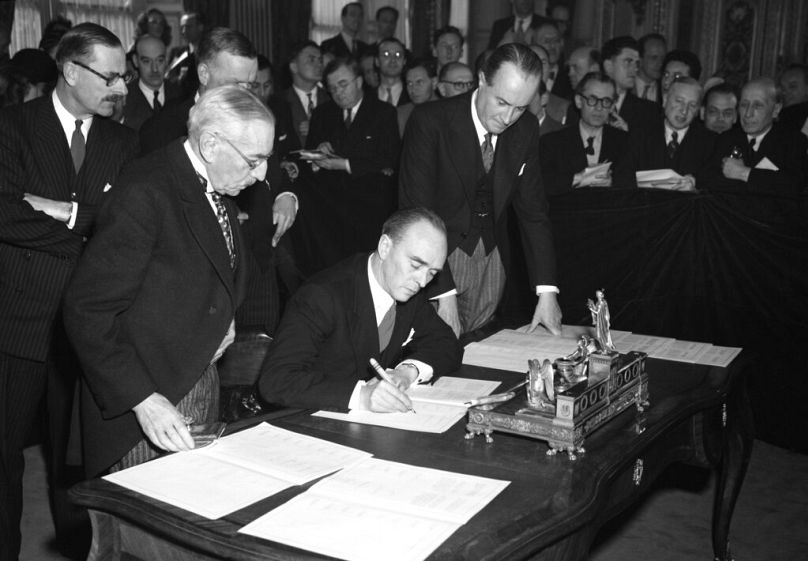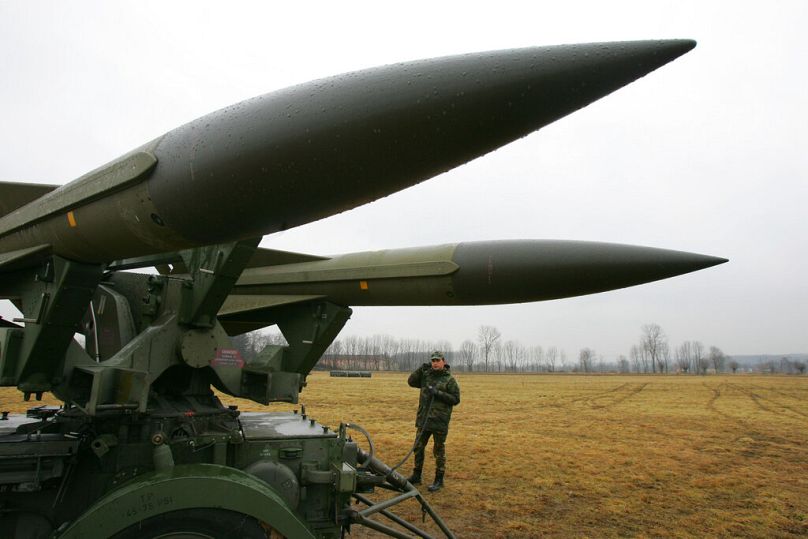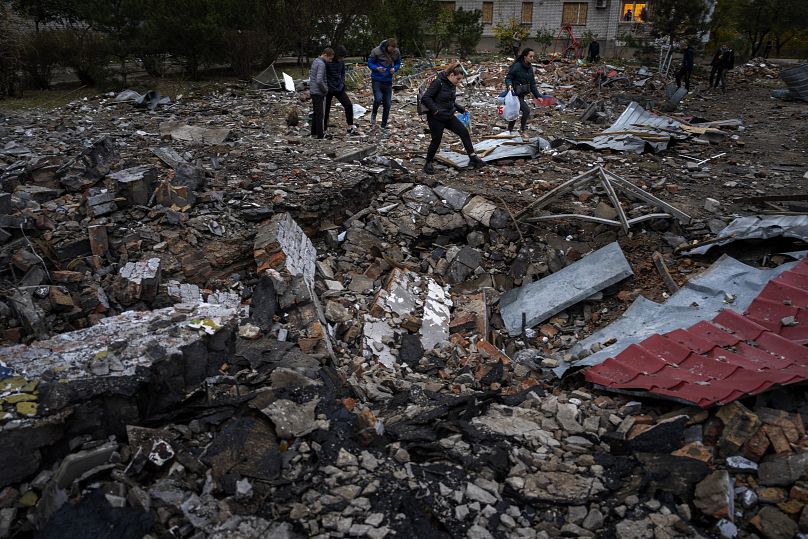These are the latest developments in the Ukraine war you need to know today.
1. Zelenskyy demands billions as Scholz calls for Marshall Plan 2.0
Ukraine's president asked the international community on Tuesday for more financial support to help plug a €38 billion budget deficit, caused by the Russian invasion.
Via video link, Volodymyr Zelenskyy urged politicians and experts gathered in Berlin for an international conference on Ukraine's reconstruction to "take a decision" and fill the country's 2023 budget deficit.
"It's a very large sum of 38 billion dollars," he said, adding this was for "the salaries of teachers, doctors, it's social benefits, pensions."
At the opening of the meeting, German Chancellor Olaf Scholz said reconstruction should "start now", believing "a new Marshall Plan for the 21st century" was needed.
The Marshall Plan was a massive, US-funded spending project that helped rebuild Europe after the devastation of World War II.
Rebuilding Ukraine is "a challenge for generations", Scholz continued, adding it would also be an opportunity to modernise the country's "roads, bridges, hospitals, and means of transport".
President of the European Commission Ursula von der Leyen was at the conference, calling the destruction in Ukraine "astonishing".
“The World Bank estimates the cost of the damage at €350 billion ... That is certainly more than any one country or union can provide alone. We need everyone on deck".
Zelenskyy added that money was urgently needed to help Ukraine "get through the winter and save people from a humanitarian catastrophe."
This would "save the European continent (...) from a migratory tsunami", he added.
Millions of Ukrainians have fled their country since the war began in February, filling westwards and to Russia and Belarus in the east.
2. US mulls air defences for Ukraine
The United States is considering sending older HAWK air defence equipment to help Ukraine defend itself against Russian drone and cruise missile attacks, two officials told Reuters.
HAWK interceptor missiles would be an upgrade on the Stinger missile systems -- a smaller, shorter-range air defence system -- that Washington has already sent to Ukraine.
Russia has recently inflicted severe damage on Ukraine's energy and utility infrastructure, allegedly with the help of Iranian-made drones. Both Iran and Russia deny they are being used.
It is still unclear how many HAWK systems and missiles the US will send to Ukraine. The White House has declined to comment.
US President Joe Biden pledged to Zelenskyy that Washington would provide Ukraine with advanced air systems after a devastating missile barrage from Russia earlier this month.
Yet Washinton is wary of providing Ukraine with very long-range military tech over fears of creating an escalation with Russia.
NATO Secretary General Jens Stoltenberg has also said that Spain intends to send four HAWK launchers.
Since Russia invaded Ukraine in February, the United States has sent around $17.6 billion (€17.7bn) worth of security assistance to Kyiv.
3. Blast rocks Russian-occupied city
A large explosion hit Melitopol in southeastern Ukraine on Tuesday, injuring five, Moscow-installed authorities said in a statement.
"A car exploded in Melitopol near the building of the media holding company ZaMedia," officials in the Russian-occupied city said on Telegram.
"Five people were slightly injured" in the blast, which shattered windows and blew off the doors on several floors of the building, according to the same source.
One of the injured was hospitalised, the statement added.
Melitopol city is located in the eastern Zaporizhzhia region, which was annexed in September by Russia along with three other Ukrainian regions -- Donetsk, Luhansk, and Kherson.
Russian public television Russia 24 broadcast images of the building, with partially charred walls and stairs cluttered with debris.
The building housed a pro-Russian television and radio station. They "continue their activities", city authorities have said.
Another Russian-installed official, Vladimir Rogov, added that the blast had affected several nearby apartment buildings posting on his Telegram account photos of buildings with broken windows.
"Dozens of civilian apartments in the city were damaged," he said.
Meanwhile, a regional Ukrainian governor in Donetsk said on Tuesday that seven civilians were killed and three others wounded on Monday in the town of Bakhmut.
On Monday, Ukrainian troops repelled Russian attacks near ten locations -- including Bakhmut -- in the eastern regions of Donetsk and Lugansk.
4. Norway arrests suspected Russian spy
Norwegian police on Monday arrested a suspected Russian spy in the Arctic town of Tromsø, according to the country's PST security service.
The man, who worked as a scientist at the University of Tromsø, had posed as a Brazilian citizen, but police believe he was working for one of Russia’s intelligence services under a false name and identity.
A local court ordered the suspect to be held for four weeks. He denies any wrongdoing.
The man represents a "threat to fundamental national interests" and should be expelled from Norway, deputy chief of the PST Hedvig Moe told national broadcaster NRK.
NATO-member Norway borders Russia in the Arctic and has ramped up security in the wake of Moscow's invasion of Ukraine earlier this year.
The man, who had been in Norway since 2021, was believed by the PST to have sought to establish himself in the country under a false identity while secretly working for Russian intelligence, NRK reported.
The PST is reportedly "concerned that [the man] may have acquired a network and information about Norway’s policy in the northern region,” Moe said.
“Even if this network or the information bit by bit is not a threat to the security of the kingdom, we are worried that the information could be misused by Russia," he added.
Moe said the Norwegian security agency had collaborated with other countries without specifying who.
“International cooperation is important in the work with illegals because they are very careful and are often good at hiding and operating for a long time in the country,” Moe was quoted by NRK as saying.
Several Russian citizens have been detained in Norway in recent weeks, including three men and a woman who were seen allegedly taking photos in central Norway of objects covered by a photography ban. They have since been released.
European nations have heightened security around key energy, internet, and power infrastructure following underwater explosions that ruptured two natural gas pipelines in the Baltic Sea.
5. Warring parties react to new UK leader
Ukraine and Russia have had mixed reactions to today's appointment of Rishi Sunak as the new UK prime minister.
Addressing the nation in his first public speech, Sunak reiterated British support for Ukraine in the "terrible war" waged by Moscow, saying it must "end with a success" for Kyiv.
Zelenskyy said he was ready to "continue to strengthen" ties between Ukraine and the UK, one of Kyiv's principal European allies.
Reacting to Sunak's appointment, Russia said it saw "no hope" of improved relations with the UK.
"At the moment we see no premise, no foundation and we have no hope for any positive changes in the near future," Kremlin spokesman Dmitry Peskov told reporters.
Relations between Russia and the UK have deteriorated sharply since the start of the war, reaching their lowest ebb since the days of the Cold War.
Ukraine has received much military and political support from London, alongside other Western capitals, while Russia has been subject to bruising international sanctions.
The UK is helping train Ukrainian soldiers before they fight Russian forces in Ukraine.
"Russia remains open and ready to talk about difficult issues at the negotiating table," said Peskov on Tuesday, adding it would not do so "to the detriment of its interests".














